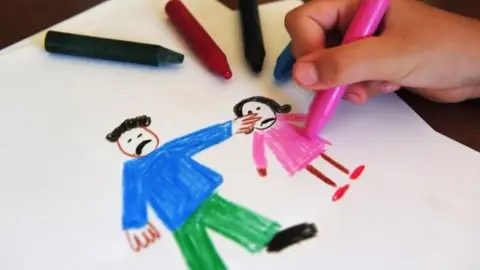Extra funds to help victims of domestic abuse during pandemic
 Getty Images
Getty ImagesOrganisations helping women who have suffered domestic abuse are to receive an extra £4.2m to help with an increase in demand for services during the coronavirus pandemic.
The money will allow groups to take on more staff and operate centres over longer hours.
It will also help improve IT and digital services.
Scottish Women's Aid has welcomed the cash, saying it expects further demand on its services as lockdown eases.
The announcement follows a Scottish government report on the impact of Covid-19 on the mental health of victims.
It reports suicidal thoughts, depression and increased substance misuse as a coping mechanism.
It also suggests that at the start of the lockdown, abusers were drinking more alcohol making the violence more frequent and severe.
Marsha Scott, chief executive of Scottish Women's Aid, said: "This injection of financial support will provide some much-needed stability for groups against a backdrop of precarious, patchwork local funding.
"As lockdown and other measures ease, our local groups are anticipating even more demand for their specialist services as survivors begin to have more opportunities to seek support.
"Additionally, if faced with a second wave of the virus, this funding will strengthen the responses of groups and allow them to build on the progress they have made in delivering services remotely."
'Major concern'
Ms Scott added: "The challenges they've faced have been huge as Covid-19 has given abusers more tools to control and harm women and children."
Equalities minister Christina McKelvie said: "The greater risks to women and children of domestic abuse, with referrals to frontline services increasing during the pandemic, is a major concern.
"It is atrocious that this is the case but we are focused on ensuring that frontline services can meet the increased demand for support.
"Any kind of violence is unacceptable and the safety and wellbeing needs of women and children need to be protected - that is even more important during a pandemic."
